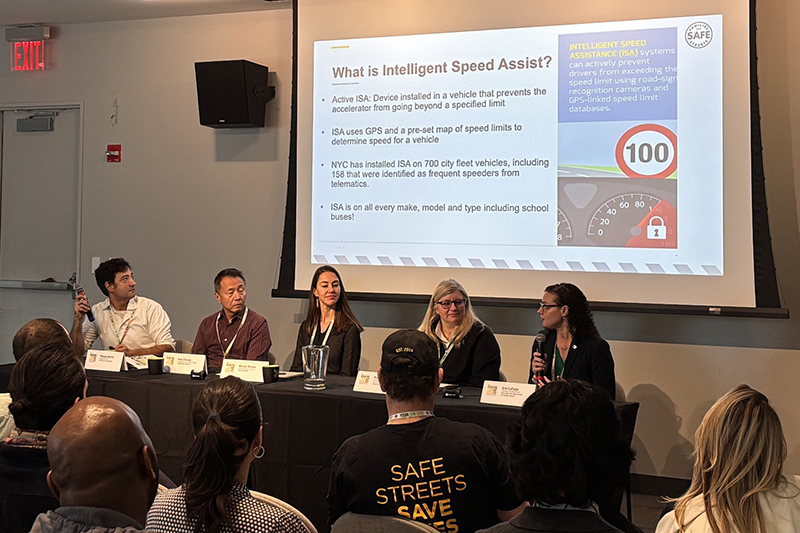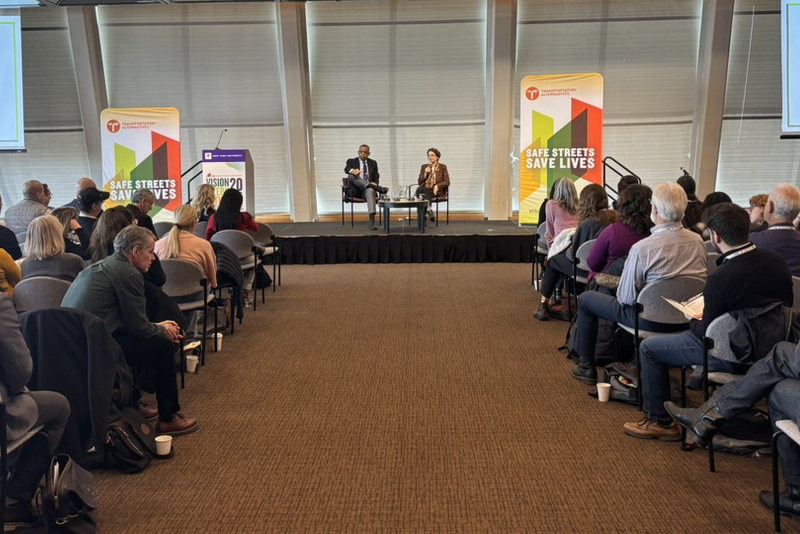ISA Gains Traction Across the US: Ten Lessons from the Frontlines

In the United States, speeding remains one of the most persistent and preventable causes of road deaths — but a new movement is demonstrating that change is possible. A recent Vision Zero Cities Journal article, Ten Lessons from the Frontlines: How State-Level ISA Bills Are Gaining Ground in a Polarized America, written by FIA Foundation’s Natalie Draisin and Families for Safe Streets’ Thomas DeVito, documents how state-level efforts to require a proven speed management technology - Intelligent Speed Assistance (ISA) - are finding traction across political lines.
The piece traces the evolution of the #StopSuperSpeeders campaign, launched in 2023 by Families for Safe Streets and Transportation Alternatives with FIA Foundation support. What began as a New York City initiative has now grown into a national movement, advancing ISA legislation in Arizona, California, Maryland, New York, Virginia, and Washington, DC, with laws already enacted in the latter two. The concept is simple but transformative: just as states require ignition interlocks for convicted drunk drivers, ISA would prevent “super speeders” - repeat high-risk offenders - from exceeding posted limits.
The article offers ten hard-earned lessons from advocates and legislators on the frontlines. Among them: focus on the most dangerous drivers; pair inside knowledge with grassroots voices; and center the lived experiences of crash victims to turn data into action. Other takeaways emphasize tailoring strategies to state politics, building bipartisan support, and using city fleet programs - such as New York City’s pioneering ISA pilot - to prove that the technology works. Across these lessons runs a common thread: progress requires pragmatism, persistence, and people power.
These ideas took center stage at this year’s Transportation Alternatives Vision Zero Cities Conference in New York, where Draisin joined Thomas DeVito, Ivan Cheung (retired FHWA/NTSB), Erin LaFarge (NYDOT) and Kim Summerlot (Learn.net) to discuss “The Speed Safety Playbook: Harnessing Technology and Community Power.” The panel explored how communities are using technology, data, and survivor advocacy to manage speed and prevent crashes. “At the FIA Foundation, we’re proud to support Families for Safe Streets because ISA works,” Draisin said. “We’ve seen in London and New York City that ISA reduces speeds, smooths trips, and cuts emissions. It’s a technology that protects people and moves communities forward.”

Speakers underscored how data identifies a small number of “super speeders” who pose the greatest risk, and how ISA can effectively target these high-risk drivers. “Real progress means looking upstream - understanding not just how crashes happen, but how to stop them before they do,” said Ivan Cheung. The conversation built on ideas shared earlier in the conference by former US Transportation Secretary Anthony Foxx, who highlighted the power of “communities of practice,” - people learning from and supporting one another to drive change - and by Polly Trottenberg, Dean of NYU Wagner Graduate School of Public Service and former USDOT Deputy Secretary, who noted that “the most challenging times are the most creative.”

Building on the Vision Zero Cities Journal article, Families for Safe Streets, with support from the FIA Foundation, recently released a new policy blueprint: Stop Super Speeders: A Policy White Paper on Requiring Intelligent Speed Assistance for High-Risk Drivers. The white paper, developed in partnership with Advocates for Highway and Auto Safety, America Walks, the ACLU, National Road Safety Foundation, National Safety Council, Policing Project at NYU Law, SteerSafe Partnership, and Vision Zero Network, offers a framework for states considering ISA legislation. It addresses issues of technology, privacy, and implementation, while showing how a targeted, active ISA program can reduce speeding, strengthen equity, and save lives.
“Speeding kills. Repeat offenders, or ‘super speeders,’ threaten all communities,” said Draisin. “This white paper is a roadmap for states to respond effectively and equitably.”
Momentum continues to grow. Families for Safe Streets members have been featured in People magazine and across local and national media outlets in Tennessee, Wisconsin, North Carolina, New York, and the UK. New ISA legislation is already advancing in Arizona, Maryland, Georgia, and California, with more than a dozen new bills expected in the next legislative session.
From New York to London, and statehouses across America, there is promising appetite for this technology that makes roads safer and transcends political lines.



